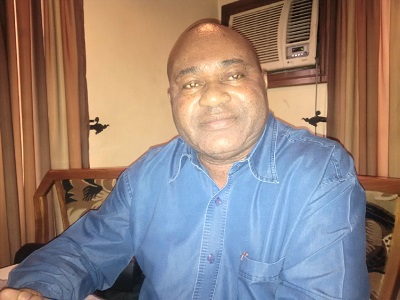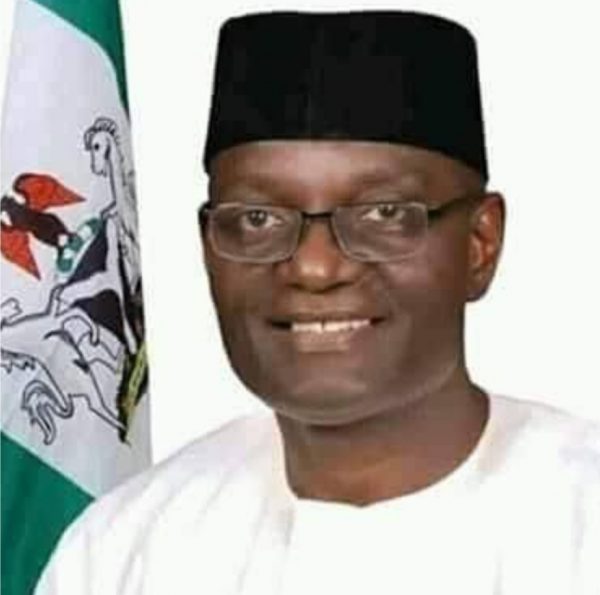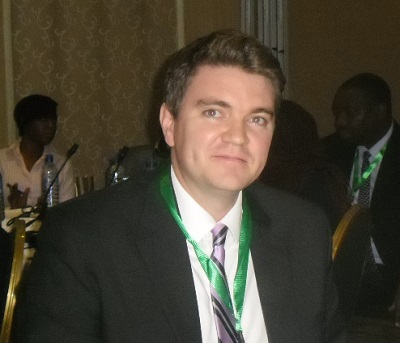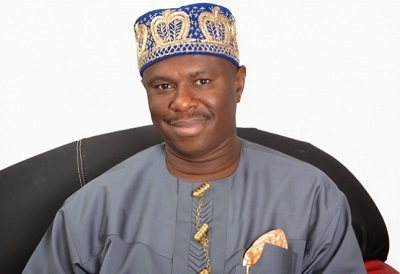Nigeria’s Cabotage Fee Collection Flawed Without Shipbrokers – Ebare
By Kenneth Jukpor & Chioma Akabuogu
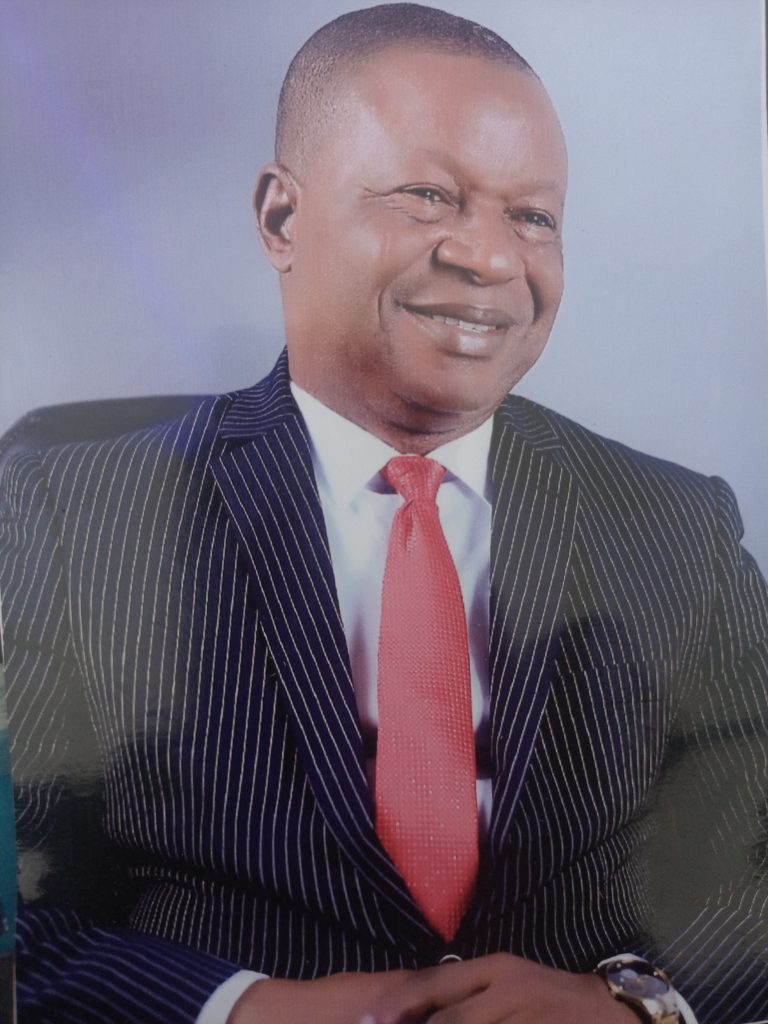
Dr. Chris Ebare is the new Chairman of Institute of Chartered Shipbrokers (ICS) Nigerian chapter. After the Institute’s recent Annual General Meeting and election the penultimate week, Ebare had this exclusive interview with MMS Plus newspaper. He addressed a wide range of maritime issues, with keen interest on the roles of shipbrokers and the numerous gains evading the sector without ship brokerage.
Enjoy it:
In your maiden address as Chairman of ICS Nigeria, you mentioned the need to provide the political element to solve maritime industry challenges, especially those affecting shipbrokers in Nigeria. How do you intend to achieve this?
We need to be very close to the government of the day particularly, the Ministry of Transportation. The current Minister of Transportation, Hon. Rotimi Amaechi may not know much about the Institute of Chartered Shipbrokers. He mayn’t know that shipbrokers are actually the ones who call the shots in global shipping. The top shots in the International Maritime Organization (IMO) are members of ICS and we sit on the same table to discuss issues. We can use this to our advantage to network these people because we know how to reach them.
So, it’s important to engage the Transport Minister to let him know that we’re in the meetings, classes and engagements with the top-notch players in shipping. I’m a member of The Baltic Exchange. This group comprises the biggest ship owners. The late Ojo Madueke when he was Minister of Transportation said something laughable and remarkable, yet very instructive. He said he attended an IMO meeting and didn’t understand the ‘english’ they were speaking. What he meant was that he didn’t understand the language they were speaking and he stressed that there was a need to professionalize the maritime sector.
We need to seek audience with the Minister even though he is busy politically. We have to tell the Transport Minister that this Category C status on the IMO Council that Nigeria is seeking can be gotten through ICS. I understand that there are some industry issues that have been highlighted as shortcomings but the network opportunity to clarify these issues are available at the Institute.
I recall an experience at Nigerian Shippers’ Council (NSC) where one of the top Directors, Mrs. Dabney Shall-Holma went to the ICS International headquarters for an arrangement to train members of staff at Shippers’ Council. She was directed to come to the ICS members in Nigeria that she didn’t know existed. At the headquarters, she was given contacts of Nigerians that were also practicing in the country. So, she came back to Nigeria to work with the operators in-country. These are the kind of partnerships ICS Nigeria needs to harness and it explains the political will.
The immediate-past Chairman of ICS Nigeria, Mr. Tami Adu said Cabotage Vessel Finance Fund (CVFF) has been politicized. Do you agree with him and what’s your opinion on the non-disbursement of the fund?
I agree with him to some extent but I also have some reservations. I was one of those that defended NIMASA at a breakfast roundtable where ship-owners attacked NIMASA insisting that the money had to be shared in various manners.
As a maritime lawyer and Chartered Shipbroker, I asked them to show the Directors of their companies. I wanted to be sure I wouldn’t see their daughters, sons or family relations as Directors. Ship ownership is beyond family business as about 64 shareholders should be involved in a shipping company. There should be diverse investors and directors and not one surname dominating the board or investors.
CVFF is more than a contributory fund like an ‘esusu’ or ‘ajo’ because people can’t just access the fund and buy ships. The fund required to buy ship is huge; we should be looking at over $300million to purchase a good ocean-going vessel. How much is in NIMASA’s CVFF purse? Would one company be allowed to collect this amount? These types of vessels aren’t owned by father, mother, sister or relations. These are huge assets acquired through ship-husbandry. Investors come together to buy it, crew it properly and get the requisite certification. Then, they put it on the seas and it can stand the taste of time. All these people that are asking for money can’t acquire significant vessels with such funds. So, let us mean business in Nigeria. If we mean business, we will be able to do things right.
We can draw an analogy from the aviation sector where someone can have just one airplane but it has to be airworthy. We shouldn’t toll with lives and properties with sub-standard vessels.
Earlier you stressed the place of shipbrokerage in the collection of the 2 percent Cabotage fee. Can you clarify this role?
Ordinarily, all around the world, shipbrokers are the ones contracted to collect that money for the shipping company and agencies. At the end of the day, shipbrokers will earn their fees for facilitating the collection. If things are being done rightly in the Nigeria, shipbrokers should be playing this role. We shouldn’t have a system where a regulator appoints a friend or relative to register a company for this purpose. The consequence is that some of these untrained practitioners will run into hitches.
We should be aware that whatever we are doing in this country, especially in the maritime sector, is known to the outside world. Some of these operators come to do business in Nigeria and they observe the unprofessional approach in Nigeria which is different from the procedures in their countries.
What are your plans on the legal framework for ICS domestication in Nigeria; what have you done in this area?
The international team in London has sent us their certificates to reactivate the charter. We have prepared the law and liaised with them at the National Assembly. They have told us what to do and we are on that process.
As a lawyer, I’m keen on achieving this and it was part of the things we discussed at our inaugural meeting after the elections.
Having served as an executive on the former board, what new initiatives are you bringing onboard?
Growing membership is very important for ICS Nigeria. This is one Institute where the membership qualification is very strict. We cannot say because someone is a former governor or a serving president, the person gets the certificate. It also doesn’t matter if someone is a Professor with numerous first-class results. All members have to work for it, sit for the examinations and pass. It took me five years to pass it despite being a masters’ degree holder in maritime law.
One can’t be in a comfort zone and pass these examinations. It took sacrifice to pass the exams and that’s why we are few in the country.
However, we go to universities and the Law School to encourage people and to lecture them. We see the excitement when people hear the benefits and every other thing. Most people usually want to take it but when they enter and discover it is so tough; most run away. That is why most of my senior colleagues who are Professors, Academics, top lawyers and the rest; are not chartered shipbrokers.
That is why; I can beat my chest in this context and say I am the only Maritime Legal practitioner who is a chartered shipbroker and a Fellow. To become a Fellow, you must have been tested and proven to be a top player in the shipping industry.
Nevertheless, we are going to keep encouraging people and grooming them to take the exams. It is not the money that is the challenge to most people because it’s just 400 pounds to register and do diploma. But if you want to go straight for your membership, it’s more costly. It is not the money that’s the challenge, but the sacrifice to study and write exams.
The absence of National Single Window has been attributed to the inefficiency of Nigerian ports. Do you agree with this assertion and what can ICS do to help?
Nigeria is almost 62 years and at this time we should have learnt to do the right things at the right time. We should also put the round pegs in round holes. The absence of national single window at Nigerian ports despite the deliberations about it for over a decade is a factor indicating that we aren’t getting things right at the ports.
I hope one day in the near future, we will get it right at the ports, but we have to engage people that are grounded and in the area of their specialization.



